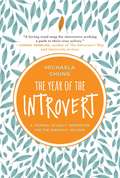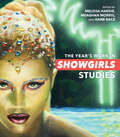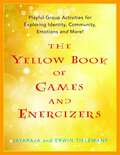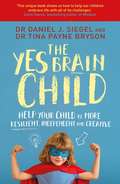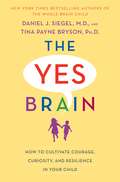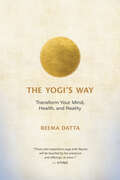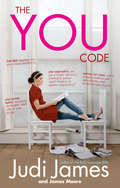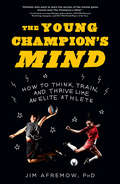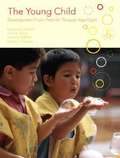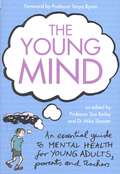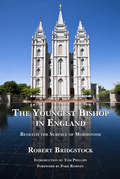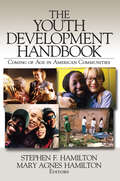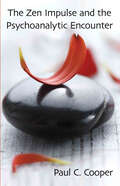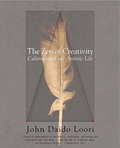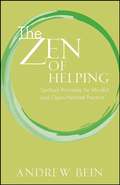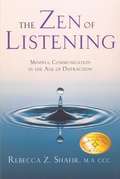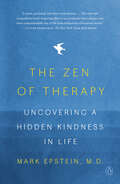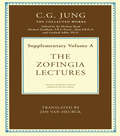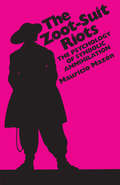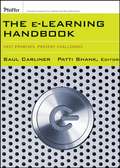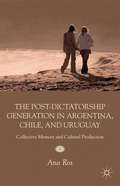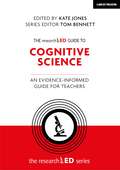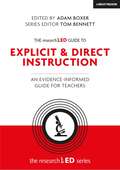- Table View
- List View
The Year of the Introvert: A Journal of Daily Inspiration for the Inwardly Inclined
by Michaela Chung365 quotes, insights, and journaling prompts for the blossoming introvert.The Year of the Introvert is a seasonal daybook and journal that takes introverts on a true adventure in introspection and self-care, 365 days of the year. With each page of daily insight, Michaela Chung provides an interactive roadmap for introverts who wish to embrace who they are and live a fulfilling—and powerful!—life on their own quiet terms. Within these pages, you’ll discover quotes, prompts, and inspirational essays to propel you toward greater self-awareness, and self-love. Along the way, you’ll receive daily morsels of wisdom to strengthen your relationships, develop authentic confidence, survive the holidays, and truly blossom in your own introverted way. Ask introspective questions to awaken your inner adventurerGet tips on how to love your introversion and yourselfLearn how to cut through small talk and truly connectBe quietly magnetic in your romantic relationshipsBuild cozy living spaces that will replenish your energyAnd more!The Year of The Introvert is the ideal introvert’s companion for navigating the challenges and joys of being an introvert in an extrovert’s world. Reflect on your quiet strengths, water your natural wellspring of creativity, and take ownership of your “innie” life!
The Year's Work in Showgirls Studies (The Year's Work: Studies in Fan Culture and Cultural Theory)
by Kara Keeling Adrian Martin Shawna Tang Anna Breckon Kieryn McKay Jane Chi Park Zahra Stardust Billy StevensonThe Year's Work in Showgirls Studies is a fan culture volume that deconstructs how and why Showgirls, a 1995 drama with a female lead bent on becoming a famous performer in Las Vegas, became a much-contested cult film despite being a critical failure when it released. The collection orchestrates a conversation between scholarly essay work and archival documentation offering a magnificent representation of the array of responses generated by the film, its makers, its promoters, and its audience. A multifaceted approach to the film, its popularity, and its social relevance results in a new text for understanding normative social hierarchies of sexuality, race, and gender. The Year's Work in Showgirls Studies engages with the figurative and actual place of sex work and feminized affective labor in our society.
The Yes Brain Child: Help Your Child be More Resilient, Independent, and Creative
by Ph.D. Tina Payne Bryson Daniel J SiegelChildren can often act out or shut down when faced with a setback or a tricky issue like homework, food or screen time. This is what acclaimed parenting experts Dr Siegel and Dr Bryson call the ‘No Brain’ response. But you can help your child develop the ability to cope, solve their own problems and thrive by nurturing their ‘Yes Brain’. Drawing on their successful work with thousands of parents and children from all backgrounds, Dr Siegel and Dr Bryson provide the advice, tools and activities to help parents with children of all ages.This is what the ‘Yes Brain’ approach looks like in action: *A 5-year-old boy thinks about his first day at school and says, ‘I’m nervous but I’ll give it a try.’ *An 8 year-old girl says, ‘I’d like to join the football team, even though none of my friends like football.’ *A 14 year-old boy looks at a test he’s earned a D- for and says, ‘That’s not the mark I wanted but it’s not the end of the world. I’ll ask the teacher how I can improve.’
The Yes Brain: How to Cultivate Courage, Curiosity, and Resilience in Your Child
by Daniel J. Siegel Tina Payne BrysonFrom the authors of The Whole-Brain Child and No-Drama Discipline, an indispensable guide to unlocking your child’s innate capacity for resilience, compassion, and creativity.When facing challenges, unpleasant tasks, and contentious issues such as homework, screen time, food choices, and bedtime, children often act out or shut down, responding with reactivity instead of receptivity. This is what New York Times bestselling authors Daniel J. Siegel and Tina Payne Bryson call a No Brain response. But our kids can be taught to approach life with openness and curiosity. Parents can foster their children’s ability to say yes to the world and welcome all that life has to offer, even during difficult times. This is what it means to cultivate a Yes Brain. When kids work from a Yes Brain, they’re more willing to take chances and explore. They’re more curious and imaginative, less worried about making mistakes. They’re better at relationships and more flexible and resilient when it comes to handling adversity and big feelings. They work from a clear internal compass that directs their decisions, as well as the way they treat others. Guided by their Yes Brain, they become more open, creative, and resilient. In The Yes Brain, the authors give parents skills, scripts, ideas, and activities to bring kids of all ages into the overwhelmingly beneficial “yes” state. You’ll learn • the four fundamentals of the Yes Brain—balance, resilience, insight, and empathy—and how to strengthen them • the key to knowing when kids need a gentle push out of a comfort zone vs. needing the “cushion” of safety and familiarity • strategies for navigating away from negative behavioral and emotional states (aggression and withdrawal) and expanding your child’s capacity for positivity With inspirational anecdotes, fun and helpful illustrations, and a handy Yes Brain Refrigerator Sheet to keep your family on point, The Yes Brain is an essential tool for nurturing positive potential and keeping your child’s inner spark glowing and growing strong—and gifting your children with a life of rich relational connections, meaningful interactions with the world, and emotional equanimity.
The Yogi’s Way: Transform Your Mind, Health, and Reality
by Reema DattaFIND PEACE, CREATIVITY, VITALITY, AND PURPOSE Celebrated yogi Reema Datta presents her world-renowned twelve-week course in book form — an accessible and practical method for cultivating mental and emotional well-being, physical health, and spiritual nourishment. She combines ancient yogic wisdom and practices with cutting-edge science and personal stories to offer insightful solutions to the challenges of modern life. Her holistic program integrates movement and breathwork with visualization, meditation, and awareness practices. The Yogi’s Way will help you overcome challenging thoughts and emotions such as fear and anxiety, awaken your creative potential, and connect with consciousness — the deepest and most powerful part of yourself.
The You Code: What your habits say about you
by James Moore Judi JamesDid you know that the way you eat your food will be sending subliminal messages out about your sexual habits? Or that the way you decorate your desk, could be helping your boss decide about that promotion or pay rise? We're all aware of the subtle messages of design and marketing but what about the signals you send out about yourself and your personality?The You Code is the book that answers all these questions, uncovering the hidden meaning behind the simplest of choices. Judi James, with co-writer and journalist James Moore, pulls no punches in her addictive and entertaining book which gets to the nub of who you really are, telling you more about yourself than you ever wanted to know, as well as providing an intriguing insight into the people around you. From your favourite TV programme to the type of coffee you drink, even down to the filling in your sandwich, The You Code is a must for anyone who wants to find out more about themselves and, more importantly, what everyone else thinks of them.
The Young Champion's Mind: How to Think, Train, and Thrive Like an Elite Athlete
by Jim AfremowSports psychologist Jim Afremow has earned accolades from Olympians to professional athletes for his insightful approach to training the mind, body, and spirit of a competitor. Now this award-winning coach is turning his talents to student athletes in the new young adult edition of his highly praised The Champion’s Mind. As student athletes strive to balance their school and sports accomplishments, Dr. Afremow’s sage advice will be a much-needed guide in helping them navigate the field—or rink or court.The Young Champion’s Mind covers such topics as:- Tips on how to get in a “zone,” thrive on a team, and stay humble - How to progress within a sport and sustain excellence long-term - Customizable pre-performance routines to hit full power when the gun goes off or the puck is dropped
The Young Child: Development from Prebirth through Age Eight (5th Edition)
by Margaret B. Puckett Janet K. Black Donna S. Wittmer Sandra H. PetersenA thorough updating of topics including: standards for early childhood programs, the mandates of IDEA, developmental theories, changing demographics, assessments, child care practices and bullying . For child development courses that cover prebirth through age eight, this widely used text discusses major development theories as they relate to physical, social and emotional, and cognitive domains. The book contains extensive applications for those who teach and work with young children, making it particularly appropriate for early childhood education programs.
The Young Mind
by Mike Shooter Sue BaileySadly, millions of children today are affected by mental health problems, almost a doubling of the number of sufferers in just one generation. Now, in this timely new book, mental health experts provide invaluable information and guidance for concerned parents, teachers and young adults. With chapters covering subjects such as child and adolescent development, parenting skills, problems at school, emotional health and wellbeing, The Young Mind also looks specifically at some of the most distressing problems facing young people today, including anxiety and stress disorders, drugs, alcohol, self-harm and psycho-sexual development.Illustrated and written in a completely accessible style by some of the most distinguished and respected professionals in the field of child and adolescent psychiatry, The Young Mind offers a guiding hand and insight into this most vital area of mental health.
The Youngest Bishop in England: Beneath the Surface of Mormonism
by Robert BridgstockPart memoir, part analytical work, this treatise details Robert Bridgstock's life as an active Mormon, his struggles with his faith, his submerging of such doubts for the sake of keeping peace with his devout family, and his eventual departure from the Church due to the abuse he suffered. After joining the Mormon Church at the age of 18, Bridgstock went on to become the youngest Mormon bishop in England and remained active in the Church for more than four decades, serving it in many capacities and deeply studying Mormon scripture and history. But after having and voicing doubts about Mormonism, and because Church authorities and scripture never delivered satisfactory answers to his questions, he left the Church and renounced the religion. An enthralling read from a leading figure within the Church, this account provides a unique, day-to-day look into Mormon life.
The Youth Development Handbook: Coming of Age in American Communities
by Stephen F. Hamilton Dr Mary Agnes HamiltonWhat are the types of environments in which youth thrive? How do we cultivate such environments to promote optimal development and positive behavior in youth? The Youth Development Handbook: Coming of Age in American Communities provides youth and development practitioners access to current theory and research in the field of youth development, including illustrations of good practice, original case studies, and a contextual approach to such topics as youth participation and diversity. The Youth Development Handbook is designed for scholars and researchers in applied developmental science as well as practitioners and policy makers who implement youth development initiatives. The book is also recommended for use in graduate courses on youth development in the fields of Psychology, Human Development & Family Studies, and Education.
The Zen Impulse and the Psychoanalytic Encounter
by Paul C. CooperAlthough psychoanalysis and Zen Buddhism derive from theoretical and philosophical assumptions worlds apart, both experientially-based traditions share at their heart a desire for the understanding, development, and growth of the human experience. Paul Cooper utilizes detailed clinical vignettes to contextualize the implications of Zen Buddhism in the therapeutic setting to demonstrate how its practices and beliefs inform, relate to, and enhance transformative psychoanalytic practice. The basic concepts of Zen, such as the identity of the relative and the absolute and the foundational principles of emptiness and dependent-arising, are given special attention as they relate to the psychoanalytic concepts of the unconscious and its processes, transference and countertransference, formulations of self, and more. In addition, through an analysis of apophasis, a unique style of discourse that serves as a basic structure for mystical languages, he provides insight into the structure of the seemingly irrational Zen koan in order to demonstrate its function as a pedagogical and psychological tool. Though mindful of their differences, Cooper’s intent throughout is to illustrate how the practices of both Zen and psychoanalysis become internalized by the individual who engages in them and can, in turn, inform one another in mutually beneficial ways in an effort to comprehend the ramifications of an individual or collective expanding vision.
The Zen of Creativity
by John Daido LooriFor many of us, the return of Zen conjures up images of rock gardens and gently flowing waterfalls. We think of mindfulness and meditation, immersion in a state of being where meaning is found through simplicity. Zen lore has been absorbed by Western practitioners and pop culture alike, yet there is a specific area of this ancient tradition that hasn't been fully explored in the West. Now, in The Zen of Creativity, American Zen master John Daido Loori presents a book that taps the principles of the Zen arts and aesthetic as a means to unlock creativity and find freedom in the various dimensions of our existence. Loori dissolves the barriers between art and spirituality, opening up the possibility of meeting life with spontaneity, grace, and peace.Zen Buddhism is steeped in the arts. In spiritual ways, calligraphy, poetry, painting, the tea ceremony, and flower arranging can point us toward our essential, boundless nature. Brilliantly interpreting the teachings of the artless arts, Loori illuminates various elements that awaken our creativity, among them still point, the center of each moment that focuses on the tranquility within; simplicity, in which the creative process is uncluttered and unlimited, like a cloudless sky; spontaneity, a way to navigate through life without preconceptions, with a freshness in which everything becomes new; mystery, a sense of trust in the unknown; creative feedback, the systematic use of an audience to receive noncritical input about our art; art koans, exercises based on paradoxical questions that can be resolved only through artistic expression. Loori shows how these elements interpenetrate and function not only in art, but in all our endeavors.Beautifully illustrated and punctuated with poems and reflections from Loori's own spiritual journey, The Zen of Creativity presents a multilayered, bottomless source of insight into our creativity. Appealing equally to spiritual seekers, artists, and veteran Buddhist practitioners, this book is perfect for those wishing to discover new means of self-awareness and expression--and to restore equanimity and freedom amid the vicissitudes of our lives.From the Hardcover edition.
The Zen of Helping
by Andrew BeinBring compassion, self-awareness, radical acceptance, practitioner presence, and caring to the relationships you have with you patients by utilizing the advice in The Zen of Helping: Spiritual Principles for Mindful and Open-Hearted Practice. As a mental health professional, you will appreciate the vivid metaphors, case examples, personal anecdotes, quotes and poems in this book and use them as a spiritual foundation for your professional practice. Connect Zen Buddhism with your human service and address issues like dealing with your own responses to your client's trauma and pain.
The Zen of Listening: Mindful Communication in the Age of Distraction
by Rebecca Z. ShafirThis practical guide lays the inner groundwork for effective listening to improve relationships, create loyal customers and enhance memory and creativity.
The Zen of Therapy: Uncovering a Hidden Kindness in Life
by Mark EpsteinA remarkable exploration of the therapeutic relationship, Dr. Mark Epstein reflects on one year&’s worth of therapy sessions with his patients to observe how his training in Western psychotherapy and his equally long investigation into Buddhism, in tandem, led to greater awareness—for his patients, and for himself For years, Dr. Mark Epstein kept his beliefs as a Buddhist separate from his work as a psychiatrist. Content to use his training in mindfulness as a private resource, he trusted that the Buddhist influence could, and should, remain invisible. But as he became more forthcoming with his patients about his personal spiritual leanings, he was surprised to learn how many were eager to learn more. The divisions between the psychological, emotional, and the spiritual, he soon realized, were not as distinct as one might think. In The Zen of Therapy, Dr. Epstein reflects on a year&’s worth of selected sessions with his patients and observes how, in the incidental details of a given hour, his Buddhist background influences the way he works. Meditation and psychotherapy each encourage a willingness to face life's difficulties with courage that can be hard to otherwise muster, and in this cross-section of life in his office, he emphasizes how therapy, an element of Western medicine, can in fact be considered a two-person meditation. Mindfulness, too, much like a good therapist, can &“hold&” our awareness for us—and allow us to come to our senses and find inner peace. Throughout this deeply personal inquiry, one which weaves together the wisdom of two worlds, Dr. Epstein illuminates the therapy relationship as spiritual friendship, and reveals how a therapist can help patients cultivate the sense that there is something magical, something wonderful, and something to trust running through our lives, no matter how fraught they have been or might become. For when we realize how readily we have misinterpreted our selves, when we stop clinging to our falsely conceived constructs, when we touch the ground of being, we come home.
The Zofingia Lectures: Supplementary Volume A (Collected Works of C. G. Jung #1)
by C.G. JungThe Zofingia Club was a discussion group to which C.G. Jung belonged as a medical student: in 1897 he became Chairman, and gave five lectures. These have survived and are published here in a supplementary volume to the Collected Works. The lectures are of great interest to anyone concerned with Jung's early ideas, as a young medical student from a strongly Swiss Protestant background. The Lectures are: The Border Zones of Exact Science (November 1896); Some Thoughts on Psychology (May 1897); An Inaugural Address on Becoming Chairman of the Zofingia Club; Thoughts on the Nature and Value of Speculative Inquiry (Summer 1898); and Thoughts on the Interpretation of Christianity with Reference to the Theory of Albrecht Ritschl (January 1899).
The Zoot-Suit Riots: The Psychology of Symbolic Annihilation (CMAS Mexican American Monograph)
by Mauricio MazónLos Angeles, the summer of 1943. For ten days in June, Anglo servicemen and civilians clashed in the streets of the city with young Mexican Americans whose fingertip coats and pegged, draped trousers announced their rebellion. <P><P>At their height, the riots involved several thousand men and women, fighting with fists, rocks, sticks, and sometimes knives. In the end none were killed, few were seriously injured, and property damage was slight and yet, even today, the zoot-suit riots are remembered and hold emotional and symbolic significance for Mexican Americans and Anglos alike. The causes of the rioting were complex, as Mazón demonstrates in this illuminating analysis of their psychodynamics. Based in part on previously undisclosed FBI and military records, this engrossing study goes beyond sensational headlines and biased memories to provide an understanding of the zoot-suit riots in the context of both Mexican American and Anglo social history.
The e-Learning Handbook: Past Promises, Present Challenges
by Patti Shank Saul CarlinerThe e-Learning Handbook provides a critical reflection on the current state of e-learning with contributions from the world's foremost e-learning experts and best-selling authors from academe and industry, including Margaret Driscoll; Brent Wilson Lee Christopher; William Horton, L. Wayne Precht, Harvey Singh, Jim Everidge, and Jane Bozarth; Pat Brogan; Patrick Parrish; Marc J. Rosenberg and Steve Forman; Pat McGee; Philip C. Abrami, Gretchen Lowerison, Roger Cote, and Marie-Claude Lavoie; Thomas C. Reeves, Jan Herrington, and Ron Oliver; and Patrick Lambe. The book offers a comprehensive and up-to-date assessment of the technological, design, economic, evaluation, research, economic, and philosophical issues underlying e-learning. Each chapter includes a chart that summarizes the key take-away points, contains questions that are useful for guiding discussions, and offers suggestions of related links, books, papers, reports, and articles.
The meaning of things: Domestic symbols and the self
by Mihaly Csikszentmihalyi Eugene Rochberg-HaltonThis is a study of the significance of material possessions in contemporary urban life, and of the ways people carve meaning out of their domestic environment.
The post-dictatorship generation in Argentina, Chile, and Uruguay
by Ana RosThe Post-Dictatorship Generation in Argentina, Chile, and Uruguay explores how young adults in Argentina, Chile, and Uruguay make sense of the 1970s socialist projects and the ensuing years of repression in their activism, film, and literature.
The researchED Guide to Cognitive Science: An evidence-informed guide for teachers
by Kate JonesresearchED is an educator-led organisation with the goal of bridging the gap between research and practice. This accessible and punchy series, overseen by founder Tom Bennett, tackles the most important topics in education, with a range of experienced contributors exploring the latest evidence and research and how it can apply in a variety of classroom settings. In this edition, Kate Jones considers various principles from cognitive science that can be used to enhance teaching and learning, including cognitive load theory, dual coding theory, interleaving, retrieval practice and spaced practice. Kate has sourced contributions from teachers and researchers including Jade Pearce, Sarah Cottingham, Adam Boxer, Jonathan Firth, Paul A. Kirschner, Pedro De Bruyckere and Lekha Sharma. Kate Jones is a teacher and an experienced leader. She is the author of seven books and is senior associate for teaching and learning at Evidence Based Education.
The researchED Guide to Cognitive Science: An evidence-informed guide for teachers
by Kate JonesresearchED is an educator-led organisation with the goal of bridging the gap between research and practice. This accessible and punchy series, overseen by founder Tom Bennett, tackles the most important topics in education, with a range of experienced contributors exploring the latest evidence and research and how it can apply in a variety of classroom settings. In this edition, Kate Jones considers various principles from cognitive science that can be used to enhance teaching and learning, including cognitive load theory, dual coding theory, interleaving, retrieval practice and spaced practice. Kate has sourced contributions from teachers and researchers including Jade Pearce, Sarah Cottingham, Adam Boxer, Jonathan Firth, Paul A. Kirschner, Pedro De Bruyckere and Lekha Sharma. Kate Jones is a teacher and an experienced leader. She is the author of seven books and is senior associate for teaching and learning at Evidence Based Education.
The researchED Guide to Explicit and Direct Instruction: An evidence-informed guide for teachers
by Tom Bennett Adam BoxerresearchED is an educator-led organisation with the goal of bridging the gap between research and practice. This accessible and punchy series, overseen by founder Tom Bennett, tackles the most important topics in education, with a range of experienced contributors exploring the latest evidence and research and how it can apply in a variety of classroom settings. In this edition, Adam Boxer examines Direct Instruction, editing contributions from writers including: Kris Boulton; Greg Ashman; Gethyn Jones; Tom Needham; Lia Martin; Amy Coombe; Naveen Rivzi; John Blake; Sarah Barker; and Sarah Cullen.
